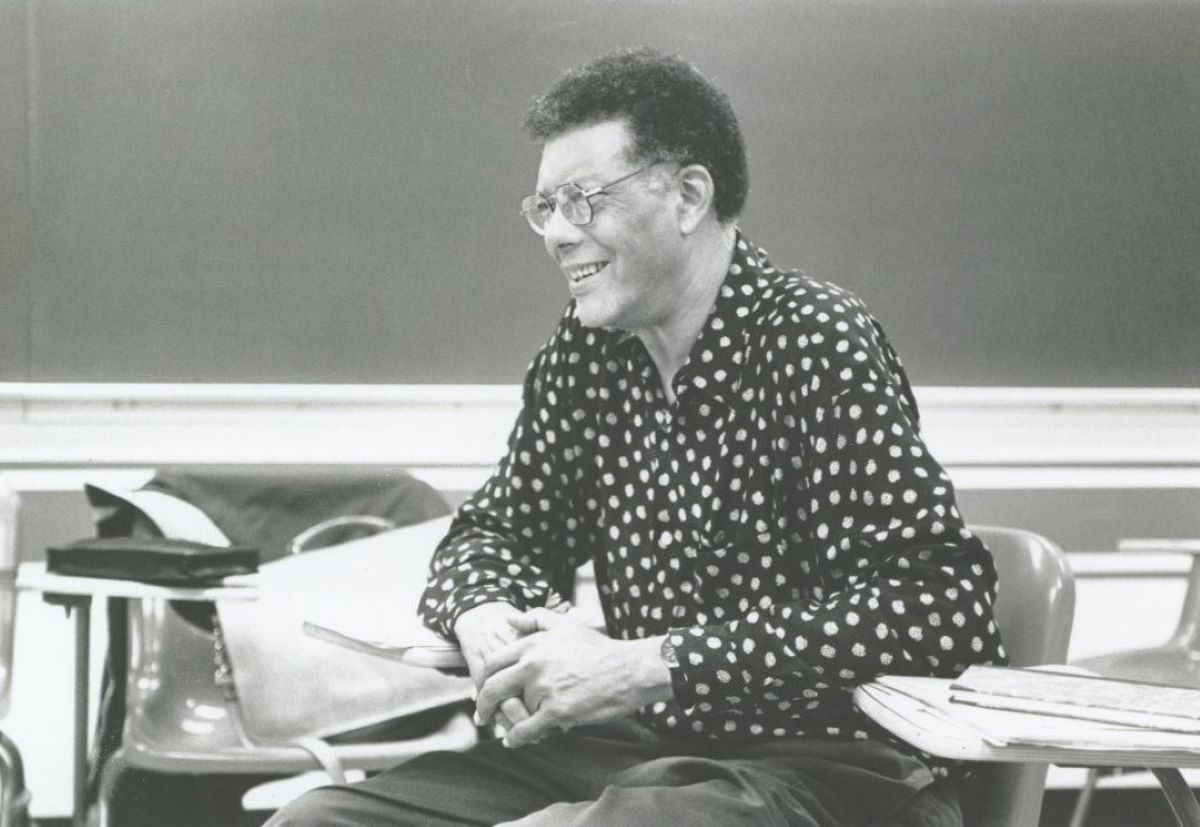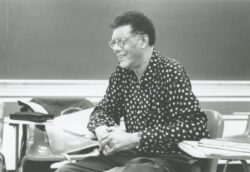Tom Dent
Tom Dent was a New Orleans poet, playwright, journalist, and researcher known for his contributions to literature and the Black Arts and civil rights movements.

Amistad Research Center
Tom Dent in the classroom between 1985 and 1997.
Thomas Covington Dent was a New Orleans poet, playwright, journalist, and researcher known for contributing to southern and national literature and the Black Arts and civil rights movements.
Early Life
Dent was born in New Orleans on March 20, 1932. His father Albert was named president of Dillard University when Dent was nine and served until 1969. Dent’s mother Ernestine Jessie Covington Dent was a masterful pianist who graduated from the Oberlin Conservatory of Music. The couple’s professional lifestyles exposed Dent and his two brothers to literature, arts, and culture at an early age.
Dent attended Gilbert Academy, an illustrious Black preparatory school in New Orleans, and later Morehouse College in Atlanta, graduating in 1952. While at Morehouse, Dent got his start as a journalist as editor of the Maroon Tiger, a student-led campus literary publication. Dent took classes in graduate school at Syracuse University but decided not to complete a degree. For two years Dent served in the US Army. He would later earn an MFA from Goddard University in Vermont.
The Dent family emphasized education, self-determination, civic duty, and civil rights. Dent wove these values into his college and military years, as well as his writing career. He often sought out artists and social communities that reflected his personal and cultural values. If none existed he was known to create communities wherever necessary, being accustomed to cultural and political networking.
After his university studies and military service, Dent settled into an apartment on East 2nd Street in New York and hosted writer gatherings. Among the writers was poet and playwright Amiri Baraka, formerly LeRoi Jones, who later played a significant role in the Black Arts Movement. Out of those gatherings, Dent created the Umbra Writers Workshop in 1962, which provided readings, workshops, and publishing opportunities.
National Civil Rights Influence, 1960–1963
In 1960 Dent began working as a media liaison for the NAACP’s Legal Defense Fund, then led by future US Supreme Court Justice Thurgood Marshall. In this role Dent met numerous like-minded activists, writers, leaders, artists, and entrepreneurs. The fund, among other things, was instrumental in supporting James Meredith’s admission to the University of Mississippi in 1962 and fighting Jim Crow.
Returning to New Orleans
In 1965, after Dent experienced a mugging in New York City, he returned home to New Orleans upon his father’s encouragement. By then Dent’s writing workshop had started to disperse, and writers were moving on to other opportunities. Dent’s return to New Orleans gave him fresh eyes to see possibilities in the city and increased his commitment to helping Black writers in the South thrive in place. As the Black Arts and civil rights movements surged in the 1960s, poetry and theater were artistic tools used to help articulate protests, Black life, and self-determination.
Around this time, Gilbert Moses, John O’Neal, and Doris Derby founded the Free Southern Theater in Mississippi. Later, Free Southern Theater moved to New Orleans in 1965, where Dent was instrumental in sustaining its work. Always seeking ways for Black writers to hone their craft and create community, Dent founded the Free Southern Theater Writer Workshop. He also served on the board and handled many of its affairs. Inspired by the theater environment, Dent wrote the evergreen play Ritual Murder, which addresses crime in Black communities.
In 1968 Dent and New Orleans poet Kalamu ya Salaam created a BLKARTSOUTH writing workshop to attract young writers and continue the momentum of the Black Arts Movement. The duo also edited the literary journal Imkumbo.
“He was a writer but not an oral poet,” Salaam said of Dent. “He didn’t feel comfortable on stage performing his work, but he supported others who did.” For example, Dent was a key participant and resource in helping establish the Black Poetry Festival held at Southern University in the 1970s in Baton Rouge. At Southern Dent helped found the acclaimed literary journal Callaloo with Charles Rowell and Dr. Jerry Ward.
Dent launched several New Orleans writing workshops, including the Congo Square Writers Workshop, which developed from the Free Southern Theater writing workshop and included all writing genres.
Dent understood the importance of literary regionalism and believed it was important for southern stories to be told and celebrated. In his essay “A Critical Look at Mardi Gras,” Dent meditates on returning to New Orleans. His exploration of elements of Black New Orleans Mardi Gras culture, such as parading, marching bands, Zulu Black face, Indian masking, social aid and pleasure clubs, and the music of Professor Longhair, investigated the cultural depths of New Orleans revelry and tradition. Dent, the son of an accomplished musician, deeply admired New Orleans music. He was friends with many local musicians, including Danny Barker, a 1991 National Endowment for the Arts Jazz Master who played on several hit songs for Cab Calloway.
At a 2022 celebration of Dent, his brother Ben noted Dent’s graciousness with his time and resources. “He always introduced people to his friends.” Dent was known as a connector of people who often spurred the creation of a Black network of writers and resources. He stayed connected to higher education at various universities and served as the Marcus Christian Lecturer in Afro-American Literature at the University of New Orleans.
Continuing to Champion Civil Rights
Not only a writer but also a historian, Dent drove across the South in his car from 1991 to 1996, embedding himself among southern workers and activists to conduct interviews and record oral histories now available at the Amistad Research Center at Tulane University. This work combined Dent’s love for people, storytelling, writing, and travel.
In his later career, Dent worked closely with New Orleanian and civil rights activist Andrew Young, who eventually became an Atlanta mayor and a Georgia Congressman, to record his oral history. The recordings were a pivotal contribution to Young’s 1996 biography An Easy Burden: The Civil Rights Movement and the Transformation of America. The two men’s friendship began in high school at Gilbert Academy and often intersected in the South during the civil rights movement and social occasions.
Death and Legacy
Dent, a former executive director and New Orleans Jazz and Heritage Foundation board member, helped launch the Congo Square Lecture Series. To honor Dent’s contributions to New Orleans and the world, the foundation renamed the lecture series, which features New Orleans artists and writers, the Tom Dent Congo Square Lecture Series.
After a distinguished writing career and cultural service to New Orleans, working to preserve the stories of the South and the civil rights movement, Dent published his final book, Southern Journey, in 1997. Dent died on June 6, 1998, in New Orleans.
